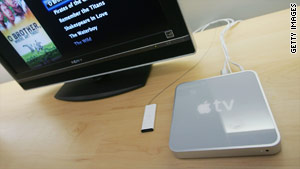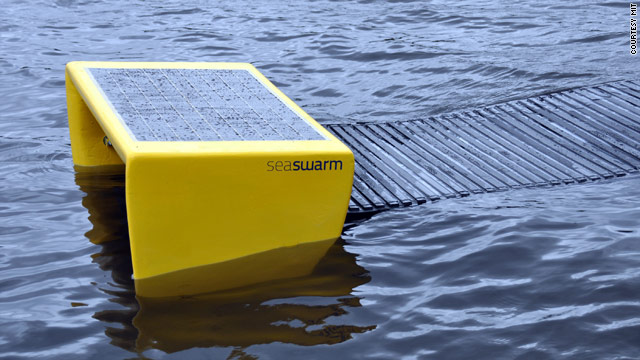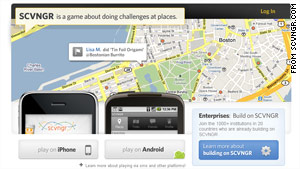
SCVNGR, a check-in-based app, has announced an integration with Facebook Places.
STORY HIGHLIGHTS
- Developers are using the "check in" idea to build new apps
- Apps such as Foursquare and Facebook will let developers build on their code
- This has resulted in apps for dating, restaurant finding and challenges
- An app called SCVNGR announces an integration with Facebook Places
(CNN) -- Seth Priebatsch was at a burrito joint in Boston recently when a message popped up on his smartphone from an app called SCVNGR.
If he opened the foil on the burrito ever so carefully and turned the wrapper into a piece of origami art -- and if he uploaded a picture of his creation to the app, the note said, then he would earn points toward a free burrito.
Priebatsch thought: That might be fun.
"I made a really weak origami crane, because I'm no origami artist myself," he said, but "it got me closer to unlocking a free burrito, which was cool."
SCVNGR, which Priebatsch helped create, is one of the latest apps to build on top of the idea of a "check-in," that emerging term some tech-savvy people use to describe the act of using a GPS-enabled smartphone to share their whereabouts with friends.
Increasingly, app developers are using existing location-based social networks -- such as Foursquare, Gowalla and, most recently, Facebook Places -- to create games, challenges, city guides and dating services.
It seems the "check-in" was just the beginning.
SCVNGR, for example, announced its integration with Facebook Places on Friday. That means people can use that free Android and iPhone app to complete challenges similar to Priebatsch's origami experiment and share that information easily with friends on Facebook. People on SCVNGR (pronounced "scavenger") also will be able to see the locations of their friends who use Facebook Places.
Users also can go onto the app and create their own challenges if they've earned enough points, Priebatsch said.
'Check-in fatigue'
Other location-based apps seek to make the act of checking in easier.
Tim Sears said he developed the Future Checkin iPhone app, for example, to help people combat a phenomenon he calls "check-in fatigue."
The app automatically checks users in through the Foursquare network when they go within a 300-meter radius of one of their favorite locations.
That's a big help if you're the kind of person who checks in all the time and gets sick of pulling your phone out of your pocket constantly to do so, he said. And it also may help cut down on the social awkwardness of checking in if you're with friends who would rather you talk to them than stare at a phone.
"If I'm at my house and I know I'm going to be at P.F. Chang's later to grab Chinese food, I could search for that place [on the app], hit 'add to favorites' and it has it on my favorites list at that point," Sears said, "so when I get with in 300 meters of P.F. Chang's it will automatically check me in and send me a notification message."
Geoloqi
An open-source group called geoloqi is trying to take that idea of an automated check-in radius even further.
The volunteer group of app developers, which is based in Portland, Oregon, is working on a website and app that will help trigger events if and when a person walks up to certain pre-set locations.
For example, you would be able to set the app to text you your shopping list when you went within a certain distance of your favorite grocery store.
Or, if you didn't show up to work by 9 a.m., you could set the app automatically to e-mail your boss saying that you're late, said Aaron Parecki, geoloqi's founder.
"We're calling these geonotes," he said, "and these are location-based notes so you can leave yourself a note that is tied to a location and pops up when you're there."
The site and the app should be up and running in about a month, he said. Geoloqi won't be a social network, exactly, but it could be integrated into Foursquare, Gowalla or other location-based networks, he said. The group has one new project up -- it's a Seattle, Washington-based website that can send you a text message, in real time, when a 911 call is placed within a certain radius of you.
Check-in guides
Other add-ons act more like guides to a city.
Foursquare has developed a number of innovative partnerships with corporations that want to advertise through the network, said Marshall Kirkpatrick, the lead writer at the tech blog ReadWriteWeb.
The Independent Film Channel, for example, launched a challenge for its viewers to review theaters, coffee shops and restaurants that exemplify the IFC brand, he said. The company picked its favorites, and people who follow IFC on Foursquare get notifications and reviews if they're nearby.
Bravo, another TV channel, also has a similar integration with Foursquare. The channel's pseudo stars, such as Lynne Curtin from "The Real Housewives of Orange County," submit reviews of their favorite spots on the app.
Yelp, the restaurant and venue review site, also has added check-ins and is expected to integrate soon with Facebook Places. On the wackier side of things, an Android app called Pee*Free collected information from Foursquare users about public toilets to get you a rated guide to free, public commodes near you.
Finally, a website called Where Do You Go takes a person's Foursquare check-ins and plots them on a heat map -- giving you a good idea of which neighborhoods in your city you visit most often and which others you may want to explore.
Location games
Other developers are interested in turning the real world into a game.
Some are using check-ins to do so, although most of these appear to be in the earliest stages, said Brian Crecente, editor-in-chief at the gaming blog Kotaku.
A few games build on top of the Foursquare network. One, called Mayor War, encourages users of that app "to fight each other with virtual weapons in real locations."
"Use eggs, wedgies, wet wellies and many more weapons to fight your friends and fellow mayors on Foursquare venues," a description of that app says.
Another, called Mob Zombies, uses location as part of a zombie fighting game.
Shopkick
Other check-in-based apps try to save people money.
A app called shopkick, for example, is trying to combine some gamelike features with real-world shopping deals.
When you sign into the app, you're shown a list of nearby retail stores. Some of those stores offer you deals if you check in from their location; others may give you a discount or points if you just walk in; and still others require you to complete some sort of challenge -- like taking a photo of merchandise -- before earning points.
Points in shopkick can be redeemed for gift cards and other prizes.
The app only works in certain cities for now, including New York, Los Angeles and San Francisco, California, and Chicago, Illinois, according to the app's website.
Further innovation
These apps may only be the beginning.
For developers to build on top of existing check-in apps, the owners of those apps must open their code for developers to tinker with.
Foursquare did this in November 2009, but others have only opened up recently or may do so in the near future. Gowalla, one of Foursquare's direct competitors, opened its code up for developers this month.
Facebook Places announced it would let a group of select partners, including Foursquare, tinker with its code.
Facebook said it will open up its check-in code to everyone to write on top of in "coming months."
That will give developers a chance to put new check-in-based apps out to Facebook's 500 million users around the globe.
This doesn't ensure the success of check-in-based apps, said Kirkpatrick, from ReadWriteWeb, but he said he hopes it will give this idea a boost.
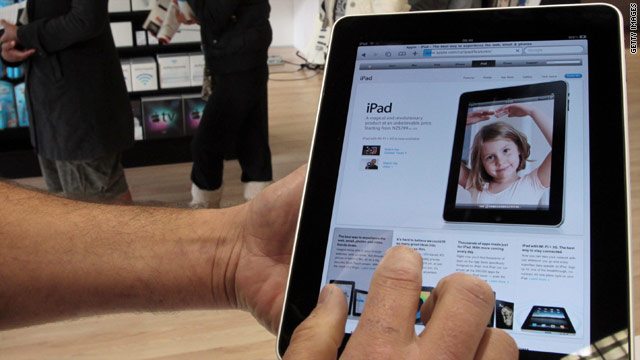









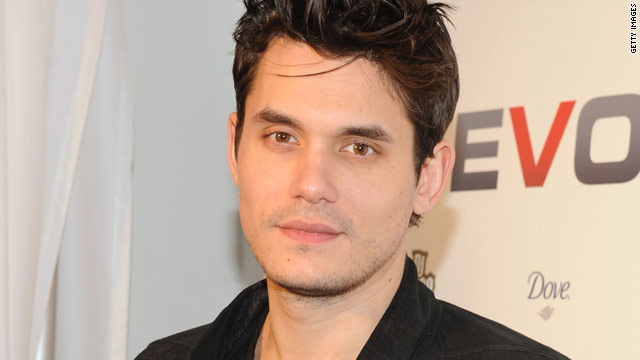
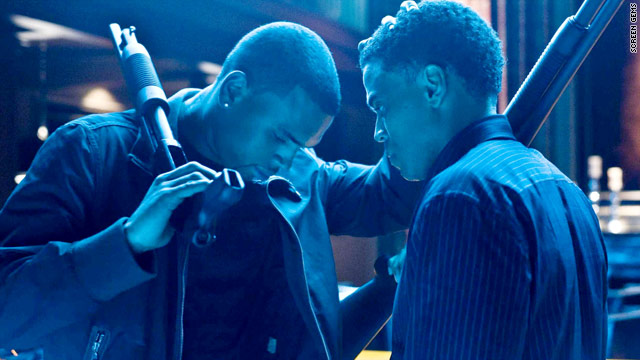
!["When the time is right, everyone will know -- even [my publicist] Cindi Berger," Mariah Carey said.](http://i.cdn.turner.com/cnn/2010/SHOWBIZ/celebrity.news.gossip/08/27/mariah.carey.superstitious.ppl/t1larg.mariah.jpg)




